|
|
|
Sort Order |
|
|
|
Items / Page
|
|
|
|
|
|
|
| Srl | Item |
| 1 |
ID:
192457


|
|
|
|
|
| Summary/Abstract |
THE world is gripped by unprecedented interest in artificial intelligence (AI). Articles, books, conferences, and seminars on AI are multiplying exponentially. More importantly, so are AI-based machines, mechanisms, and tools, which are used in practically every industry.
|
|
|
|
|
|
|
|
|
|
|
|
|
|
|
|
| 2 |
ID:
127349
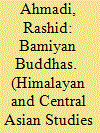

|
|
|
| 3 |
ID:
165643
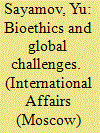

|
|
|
|
|
| Summary/Abstract |
THE UNITED NATIONS Educational, Scientific and Cultural Organization (UNESCO) pays special attention to bioethical issues when considering the social and ethical challenges facing humanity [6]. Bioethics, as an interdisciplinary field of knowledge at the intersection of philosophy, law, medicine, sociology, political science, demographics, and cultural and religious studies, addresses moral aspects of people's attitudes toward life and death. It comprises a wide range of socioeconomic, ethical and legal issues on the assumption that human values must not be considered separately from biological facts, and strives to develop moral and ethical norms, requirements and principles, establishing mechanisms for using scientific and technological achievements to benefit people and nature.
|
|
|
|
|
|
|
|
|
|
|
|
|
|
|
|
| 4 |
ID:
119946
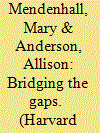

|
|
|
| 5 |
ID:
112149
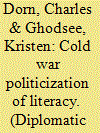

|
|
|
|
|
| Publication |
2012.
|
| Summary/Abstract |
In 1947, officials at the United Nations Educational, Scientific, and Cultural Organization (UNESCO) established an unprecedented, worldwide literacy program. Simultaneously, however, officials at the World Bank refused to support educational programming, arguing that education-related projects could not guarantee a return on Bank investments. In 1962, however, World Bank lending policies began to shift. Lending for primary education increased from zero to 14 percent between 1963 and 1978 and overall Bank spending on education rose dramatically. During this same period, however, critics increasingly questioned the central principles upon which UNESCO officials established their organization's educational programming, fearing that the organization had come under communist influence. This paper reexamines the evolving priorities of United Nations organizations during the Cold War and the increasing politicization of economic development. It offers a critical reassessment of the role of the World Bank and UNESCO in negotiating the ideological conflict between capitalism and communism.
|
|
|
|
|
|
|
|
|
|
|
|
|
|
|
|
| 6 |
ID:
188486
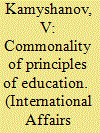

|
|
|
|
|
| Summary/Abstract |
THE ORIGIN and current state of worldwide educational systems are laid out in the pages of the monograph International Standards of Education: Lessons of History and Modernity, produced by a team of authors under the editorship of Y.A. Goryachev and published by Etnosfera in 2022 [in Russian].
|
|
|
|
|
|
|
|
|
|
|
|
|
|
|
|
| 7 |
ID:
091953
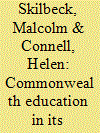

|
|
|
|
|
| Publication |
2009.
|
| Summary/Abstract |
When compared with global bodies such as the United Nations Educational, Scientific and Cultural Organisation (UNESCO) and The World Bank and with the Organisation for Economic Co-operation and Development (OECD), Commonwealth education programmes are modest in scale and resourcing. Yet there have been significant successes, including the Commonwealth Scholarship and Fellowship Plan and the Commonwealth of Learning. The distinctive features and strengths of UNESCO and OECD in international education collaboration and partnerships are useful sources of ideas for strengthening Commonwealth education. There is considerable scope for more intense collaboration and Commonwealth-wide partnerships in addressing shared concerns.
|
|
|
|
|
|
|
|
|
|
|
|
|
|
|
|
| 8 |
ID:
124516
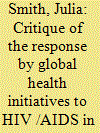

|
|
|
|
|
| Publication |
2013.
|
| Summary/Abstract |
This article provides a critical perspective on global health initiatives (GHIs) in response to HIV/AIDS in post-conflict African countries. Focusing on the Global Fund to Fight HIV/AIDS, Tuberculosis and Malaria, the President's Emergency Plan for AIDS Relief and UN bodies, it argues that many global health initiatives lack consideration of the complexities of addressing HIV/AIDS in post-conflict contexts. It finds that prevention programmes fail to prioritize the population groups who are at high risk; that treatment and care interventions are shaped by an emergency aid paradigm, which does not ensure ongoing well-being for people living with HIV/AIDS; and that global health initiatives often impede the capacity of local governance and health systems. Given that global health initiatives have yet to fully engage with the challenges of implementing HIV/AIDS interventions in conflict-affected African contexts, the article concludes by proposing recommendations in this regard.
|
|
|
|
|
|
|
|
|
|
|
|
|
|
|
|
| 9 |
ID:
149725
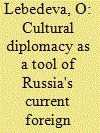

|
|
|
|
|
| Summary/Abstract |
This obviously also applies to Russia's current cultural diplomacy. Yevgeny Shmagin, Deputy Director of the Department on Cultural Affairs and Ties with UNESCO of the Russian Ministry of Foreign Affairs, underscores in his article "Culture and Diplomacy" published in International Affairs the importance of cultural diplomacy in implementing the state's foreign-policy strategy, maintaining, in particular, that "the union of diplomacy and culture has at all times served Russia's national interests, over and over again demonstrating its vitality at different stages in our history. It was cultural diplomacy with its specific set of instruments and methods to influence public opinion that was able to essentially dissolve the ice of hostile and sometimes openly biased attitudes with regard to our country during its Soviet period, mitigating the impact of various negative tendencies of political and ideological nature. During the formation of new Russian state, cultural initiatives once again helped strengthen the country's international prestige, its reputation, demonstrate the Russian society's openness, serve as an evidence of Russia's revival, and its development as a free and democratic state."
|
|
|
|
|
|
|
|
|
|
|
|
|
|
|
|
| 10 |
ID:
167574
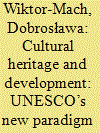

|
|
|
|
|
| Summary/Abstract |
In the 1980s, the process of convergence between culture and development began to emerge in the context of post-colonialism and changing geopolitical realities. Later on, along with increasing multilateralism, The United Nations Educational, Scientific and Cultural Organization (UNESCO) eventually became the main actor in promoting culture as a fourth pillar of sustainable development. The paradigm shift in the heritage-development agenda is examined in the context of growing aspirations of non-Western states to play an active role in the global heritage regime, and the interests and strategies of UNESCO’s secretariat and the member states. At first, heritage and development were perceived as separate or opposed fields. Recently, a sustainable development framework emerged as a new global development model. UNESCO has engaged in the shaping of the United Nations (UN) 2030 agenda, and advocated a pragmatic approach to heritage. This paper examines the evolution of ideas and concepts linking ‘development’ and ‘heritage’ forged at the forum of UNESCO as part of its Culture and Development framework. The role of the Global South in the paradigm change is highlighted.
|
|
|
|
|
|
|
|
|
|
|
|
|
|
|
|
| 11 |
ID:
159340
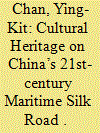

|
|
|
|
|
| Summary/Abstract |
This article suggests that Chinese scholars in Guangdong, through historical work endorsed or sponsored by their government, justify the inclusion of Southeast Asian nations in the 21st-century Maritime Silk Road (MSR) initiative. In doing so, they seek to add the MSR to the United Nations Educational, Scientific and Cultural Organization’s (UNESCO) World Heritage List. By exploring how historians and officials adhere to the expectations of the Chinese state and UNESCO in highlighting Guangdong’s role in the 21st-century MSR initiative, the article examines the production of cultural heritage at the local level in contemporary China.
|
|
|
|
|
|
|
|
|
|
|
|
|
|
|
|
| 12 |
ID:
174937
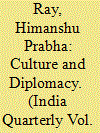

|
|
|
|
|
| Summary/Abstract |
The article argues that UNESCO’s 1972 World Heritage Convention provides a global platform for projecting not only India’s maritime cultural heritage but also building bridges and collaborative networks with other Indian Ocean littoral countries for the promotion of shared cultural practices and traditional knowledge systems of the Indian Ocean. Unfortunately, this collaborative research aspect of the World Heritage Convention has yet to be tapped for nominating and inscribing transnational heritage or cultural routes across the Ocean. This is despite the fact that India was the founder member of the intergovernmental organisation, Indian Ocean Rim Association, one of whose thrust areas relates to promoting cultural heritage on the UNESCO platform. Given India’s rich maritime past, there is an urgent need to implement measures to establish academic networks with littoral countries for not only creating awareness of the maritime cultural heritage of the Indian Ocean but also harnessing linkages between maritime communities for building a culturally diverse but harmonious future.
|
|
|
|
|
|
|
|
|
|
|
|
|
|
|
|
| 13 |
ID:
141137
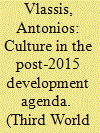

|
|
|
|
|
| Summary/Abstract |
Throughout 2012–15 several actors were advocating that culture be explicitly integrated within the post-2015 UN development agenda. My article offers an anatomy of the recent international mobilisation in order to understand the cleavages and the contrasting visions. In doing so, it seeks to analyse the policy process through which the agenda is made, why and how a critical mass of actors is attempting to embrace the inclusion of culture in the post-2015 agenda and the political reactions vis-à-vis this mobilisation. The article argues, on the one hand, that the promotion of culture in the post-2015 agenda is largely based on UNESCO’s will to advance its policy agenda and enhance its position within the UN system and, on the other hand, that this mobilisation lacks political support from the most influential governments; therefore its chances of success are more than contingent.
|
|
|
|
|
|
|
|
|
|
|
|
|
|
|
|
| 14 |
ID:
076496
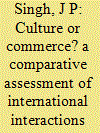

|
|
|
|
|
| Publication |
2007.
|
| Summary/Abstract |
Does international trade in cultural products threaten cultural diversity in the developing world? This article seeks to question the implied correlation by exploring the intellectual and empirical bases of the claims. Conceptually, I argue that cultural diversity viewed from the perspective of the nation-state is problematic. Politically, of course, nation-states make this claim themselves in protecting their self-interest globally. Empirically, this paper shows that nation-states at the forefront of the movement protecting cultural diversity are, in fact, top exporters of cultural products, something that is not apparent in the mercantilist position taken by these states with respect to international trade in cultural products. The paper then explores the position of developing countries explicitly taking advantage of globalization of culture to promote both their cultural distinctiveness as well as their exports. These "cultural voices," I conclude, are growing economically and socially and cannot be dismissed as playing second fiddle to those from the developed world.
|
|
|
|
|
|
|
|
|
|
|
|
|
|
|
|
| 15 |
ID:
100218
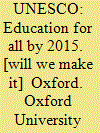

|
|
|
|
|
| Publication |
Oxford, Oxford University Press, 2008.
|
| Description |
x, 434p.
|
| Series |
EFA global monitoring report 2008
|
| Standard Number |
9789231040580
|
|
|
|
|
|
|
|
|
|
|
|
Copies: C:1/I:0,R:0,Q:0
Circulation
| Accession# | Call# | Current Location | Status | Policy | Location |
| 055470 | 379.129/UNE 055470 | Main | On Shelf | General | |
|
|
|
|
| 16 |
ID:
141217
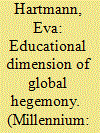

|
|
|
|
|
| Summary/Abstract |
This article seeks to further strengthen a sociological turn within International Relations (IR), which aims to make classical social theory fruitful for analysing the transnationalisation of societies. The focus is on the contribution of Antonio Gramsci’s analysis in this regard. A number of scholars have transferred his theory of hegemony to the global level in order to gain a more sophisticated understanding of global power and its transformation in reaction to the deepening of global economic integration. Surprisingly, most neo-Gramscian scholars have devoted little attention to education, despite the importance Gramsci assigned to this social sphere. The article seeks to overcome this lacuna with a study of the internationalisation of higher education since the end of the Second World War. Against the backdrop of the insights this case study provides, it will suggest some modifications of the neo-Gramscian account of hegemony with a view to taking the sociological turn more seriously, and to deepening our understanding of the social quality and the scale of the emerging postnational hegemony.
|
|
|
|
|
|
|
|
|
|
|
|
|
|
|
|
| 17 |
ID:
120723
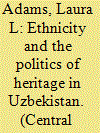

|
|
|
|
|
| Publication |
2013.
|
| Summary/Abstract |
The UNESCO office in Uzbekistan has been relatively successful in nominating cultural practices to The Representative List of the Intangible Cultural Heritage of Humanity. Selection for the List conveys prestige and draws international attention to local culture that is deemed of universal value. What is striking about the first successful nominations from Uzbekistan is that they point to the inseparability of Tajik and Uzbek culture, a touchy subject for both Uzbekistan and Tajikistan. In this article the author looks at how the politics of ethnic cultural heritage play out through these projects, highlighting the tensions between a rhetoric of diversity promoted both by UNESCO and by the official national ideology, and practices that demonstrate a more mundane, ethnically exclusive sense of national culture. Although ostensibly celebrating the rich diversity of Uzbekistan's national culture and eschewing the strict delineation of Tajik culture from Uzbek culture, the effect of UNESCO Intangible Cultural Heritage programmes is to perpetuate the occlusion of Tajik culture in Uzbekistan.
|
|
|
|
|
|
|
|
|
|
|
|
|
|
|
|
| 18 |
ID:
158179
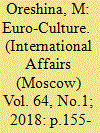

|
|
|
|
|
| Summary/Abstract |
WITH ITS ECONOMIES SHAKEN by financial woes and its system of fundamental values - democracy, the rule of law, and human rights - watered down, the European Union attaches special importance to cultural affairs, seeing them as the core of its foreign policy and the basis for its social and economic development.1 Before 1992, cultural and creative industries in the EU had been under the exclusive jurisdiction of member states. However, after the Treaty of Maastricht was signed, cultural policy became the prerogative of EU authorities, speeded up the revision of the EU's image, was one of the motives for reconsidering the European unity idea, which was rapidly losing its popularity, and, in a sense, counterbalanced European integration projects.
|
|
|
|
|
|
|
|
|
|
|
|
|
|
|
|
| 19 |
ID:
154339
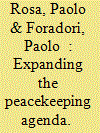

|
|
|
|
|
| Summary/Abstract |
This article aims to explain the emergence and assess the politico-military significance of ‘cultural peacekeeping’ (CPK) as a new task for international peace operations. The aim is to provide a conceptual appraisal of CPK and an initial insight into its objectives, opportunities and challenges. The analysis supports the inclusion of a cultural component in the mandates of peacekeeping interventions, even if we must be wary of the inherent difficulties and risk of unintended consequences. These are not to be underestimated, at the risk not only of failing to achieve the mission’s objectives but also of further deteriorating security on the ground and beyond. It follows that CPK should not be mistaken, nor presented to the public, as a minor, light, and inexpensive operation. Quite to the contrary, it is an extremely complex and politically very sensitive politico-military major exercise that needs careful planning and adequate capabilities. Misunderstanding or mismanaging CPK can severely backfire. It is a ‘double-edged weapon’ that must be handled cautiously to avoid the risk of the enemy manipulating it to its own advantage.
|
|
|
|
|
|
|
|
|
|
|
|
|
|
|
|
| 20 |
ID:
165648
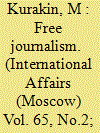

|
|
|
|
|
| Summary/Abstract |
IN DECEMBER 2018, an international forum, "Freedom of Journalism in the Context of Human Rights, New Technologies and International Information Security," took place in Pezinok, a suburb of Bratislava, the capital of Slovakia. It was attended by more than 70 experts and members of the media from 12 countries. The forum was organized by Moscow State University, the International Affairs journal, the Russian Union of Journalists, and several foreign media outlets. Russian Ambassador to Slovakia Alexey Fedotov said in his welcoming remarks that Bratislava is perhaps the best venue for such international conferences, considering the high level of mutual understanding that exists between Russia and Slovakia, as well as common Slavic historical traditions.
|
|
|
|
|
|
|
|
|
|
|
|
|
|
|
|
|
|
|
|
|